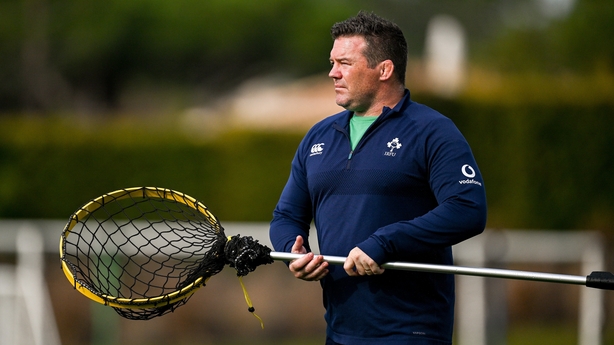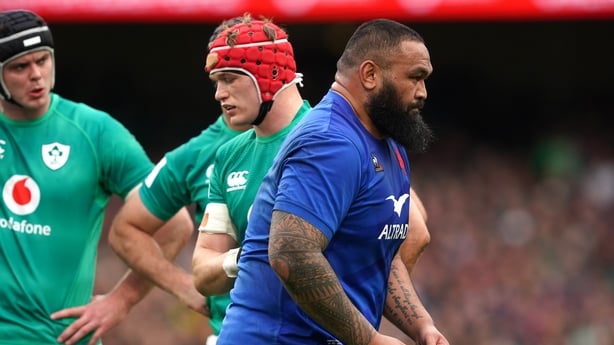It may split opinion to call the modern-day scrum a work of art, but at the very least it's all about painting the right pictures.
The most technical element of the game is viewed in the most subjective of ways. When it comes to refereeing, perception is reality.
The Ireland squad and coaching staff weren't pleased with how their scrum was treated in the World Cup quarter-final defeat to New Zealand in October. In five total scrums, Ireland conceded three penalties. In a game of hairbreadth margins, those three penalties were huge.
In the immediate aftermath of the game, head coach Andy Farrell said he and his side had "a different view" to that of referee Wayne Barnes, who singled out Andrew Porter for those penalties. Porter revealed on The Rugby Pod with Jim Hamilton that his "blood was boiling" with the interpretation of those scrum calls.
Even if you agreed with the idea that Ireland were hard done by at the scrum against New Zealand, they can equally be criticised for not adapting to the man in the middle.
John Fogarty puts it simply: "You've got to f*****g learn."
And the Ireland scrum coach (below) says the biggest lesson they learned that night in Paris is the need for a flexible plan.

"We're disappointed we conceded three penalties in that game. Very disappointed," he added.
"We've gone away and had a good look at what what it is we're doing to show the referee. I think 'anger' is the wrong word. You've got to you've got to be able to understand what's happening and be able to solve the problem. And you've got to be able to do it now."
"Me getting p****d off on the sideline, the lads getting p****d off on the pitch, it's just not going to help, we've got to be clear.
"There's moments when you're p****d off, for sure. But it's quickly pushed aside because that's a thought, it's almost a selfish thing to be thinking, you know? We've got to get some clarity on what's happening and we've got to be able to communicate it clearly.
"We've got to be able to listen, take in information, and we got to go and make it happen.
"So, yeah, you're disappointed in some of the stuff. But you've got to f*****g learn, and you've got to get better and you've got to go out and show it."
If Ireland have learned, we will soon find out.
The Grand Slam champions will lock down with one of the best and most powerful scrums in the game on Friday night against France, who are likely to go with a front row of Toulouse pair Cyril Baille and Peato Mauvaka, as well as giant La Rochelle tighthead Uini Atonio (below).

And Fogarty says they've been working hard to make sure they're painting the right pictures for this Friday's referee Karl Dickson.
"This weekend is going to be tough. Atonio has been around the block and can mess about a bit on 'bind' into 'set', fade a little bit, and hit a little bit. It's a big test for Karl Dickson.
"They're the areas, trying to show nice pictures, and post the 'set' we want to control the weight so we're not getting walked around or moving around."
Friday's scrum contest is likely to be quite different to the one Ireland came out second-best at against the All Blacks.
On that occasion, the Irish pack had more power than New Zealand, but that aggressive style ultimately went against them as they struggled with control.
Against a larger and more destructive French pack Ireland have previously struggled, notably on their last away trip in 2022.
And Fogarty says the key this week at the set-piece will be "control".
"There's definitely a few pictures we can clean up on. We don't want to show a referee or touch judge an easy image. With our props, we're trying to show as best a picture we can, being nice and square in what we're doing.
"The one thing in the game [against New Zealand] is that we were the aggressors almost, there was a huge surge of power through and we had them under a fraction of pressure, and the scrums released out and there was a bit of spin.
"How we can control weight, post the 'set', is something that we've focused on, so we want to show tidy pictures to referees and want to work with them as best we can.
"I think being able to get back to neutral is unbelievably important for front rows. We're in a space where we're unbelievably confrontational, and trying to fight our way through something.
"For us to be able to get back to neutral, find a way to communicate nice and calmly, so we can make adjustments on the run is incredibly important," he added.
Watch Wales v Scotland in the Under-20 Six Nations on Friday from 7.05pm on RTÉ Player.
Follow a live blog on France v Ireland in the Guinness Six Nations on Friday from 7.30pm on rte.ie/sport and the RTÉ News app and listen to live commentary on RTÉ Radio 1.


